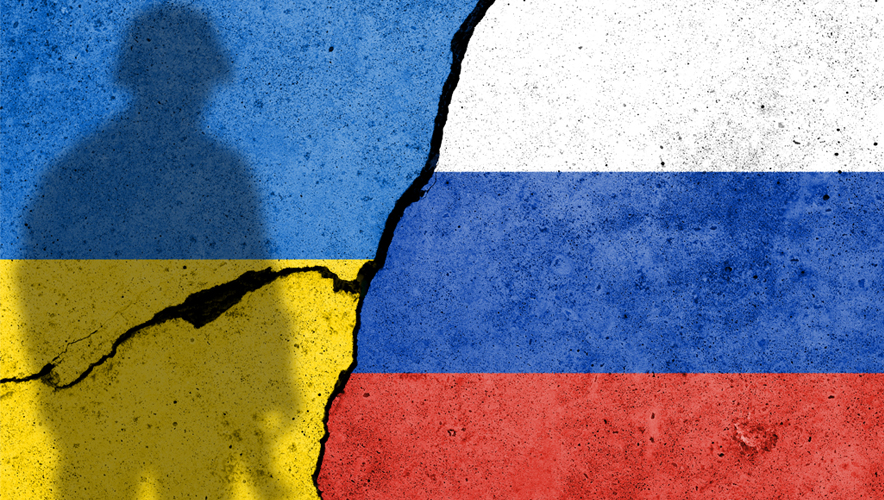Nations Leverage Sanctions Against Russia Over Incursions in Ukraine
While the United States and other nations have flatly denied the possibility of deploying troops to defend Ukraine from Russian military action, they are rolling out harsh new sanctions measures to raise the cost of invasion.
On 21 February, Russian President Vladimir Putin formally recognized two pro-Russia, separatist-controlled regions of eastern Ukraine—parts of Luhansk and Donetsk—as independent. Putin then ordered Russian troops to conduct “peacekeeping” operations there, but U.S. President Joe Biden called the move the start of an invasion, according to NPR. Putin has since received official authorization to use military force outside of Russian borders.
Hopes for a diplomatic way out of a new devastating war in Europe appear all but extinguished as the U.S. and key European allies accused Russia of rolling over Ukraine’s border into separatist regions and quickly responded with a raft of sanctions. https://t.co/Cj3pnODOhh
— The Associated Press (@AP) February 23, 2022
Meanwhile, Russia has started evacuating its embassy in Kyiv, and Ukraine urged its citizens to leave Russia, the Associated Press reported. The head of Ukraine’s National Security and Defense Council called for a national state of emergency, and the request is awaiting parliamentary approval. It will likely depend on local authorities to decide which measures apply regionally, but they could range from heightened protection for public facilities, restrictions on traffic, and transport or document checks.
Outside of Ukraine, though, the primary action has been sanctions.
Germany suspended the certification of the Nord Stream 2 gas pipeline—a 764-mile, $11 billion project connecting Russia and Germany—withdrawing a report on the effect that the pipeline would have on the security of German gas supplies, the AP reported.
The United Kingdom is hitting five Russian banks (Rossiya Bank, IS Bank, General Bank, Promsvyazbank, and the Black Sea Bank) and three Russian billionaires close to Putin with sanctions. The European Union announced sanctions that effect the 351 Duma legislators who voted in favor or recognizing the separatist regions of Ukraine as independent, as well as 27 Russian officials and institutions in defense and banking, the BBC reported.
Japan announced that the government would ban any new issuance or distribution of Russian government bonds in Japan, and it would ban travel by people linked to the Ukrainian rebel regions and freeze their assets in Japan.
The U.S. is imposing immediate economic costs in response to actions in the Donetsk and Luhansk Regions, including sanctioning major Russian state-owned financial institutions, Kremlin-connected elites, & additional restrictions on Russian sovereign debt.https://t.co/zwKGWVJDd8
— Treasury Department (@USTreasury) February 22, 2022
The United States issued sweeping sanctions against two Russian state-owned financial institutions, imposing additional restrictions on Russian sovereign debt, and sanctioning five Kremlin-connected elites, according to the U.S. Treasury Department. The moves are intended to limit Russia’s ability to raise funds to wage war and cut off key players from the U.S. financial sector. U.S. individuals and entities are prohibited from doing business with these institutions unless the Treasury’s Office of Foreign Assets Control authorizes it.
“Today’s actions, taken in coordination with our partners and allies, begin the process of dismantling the Kremlin’s financial network and its ability to fund destabilizing activity in Ukraine and around the world,” said Treasury Secretary Janet Yellen. “We continue to monitor Russia’s actions and if it further invades Ukraine, the United States will swiftly impose expansive economic sanctions that will have a severe and lasting impact on Russia’s economy.”
“Let me be totally clear: No Russian financial institution is safe if this invasion proceeds,” said a senior official in the Biden Administration, speaking on background to reporters yesterday. “We are ready to press a button to take further action on the very largest Russian financial institutions, including Sperbank and VTB, which collectively hold almost $750 billion in assets—or more than half the total in Russia as a whole.”
But will the sanctions and economic pressure work to discourage further military action in or around Ukraine?
According to 2019 research, as reported by Security Management, sanctions are an effective security tool only when used strategically and under certain conditions.
The United States is set to impose additional sanctions on Iran. But sanctions are not always an effective security tool. https://t.co/VKSFqmaTiM
— Security Management (@SecMgmtMag) January 8, 2020
The consensus reached in the academic literature on the subject is that conventional trade and financial sanctions result in some meaningful behavioral change in the targeted country about 40 percent of the time, according to Dursun Peksen, a sanctions expert at the University of Memphis in Memphis, Tennessee. Research from the U.S. Government Accountability Office (GAO) found that sanctions are more likely to be effective when they are implemented through an international organization like the United Nations and when the targeted country has some existing dependence on or relationship with the country levying sanctions.
To ensure sanctions are as effective as possible, Peksen made five recommendations for policymakers:
- Aim for immediate damage to the targeted country’s economy.
- Seek alliances with other countries and international organizations when making sanctions.
- Understand that autocratic regimes will usually be able to resist sanctions more effectively than democracies.
- Realize that adversaries will be more defiant against sanctions than allies.
- Anticipate that sanctions are more effective in achieving relatively modest security aims (like the release of a wrongfully imprisoned national) than achieving major policy objectives (political regime change).
